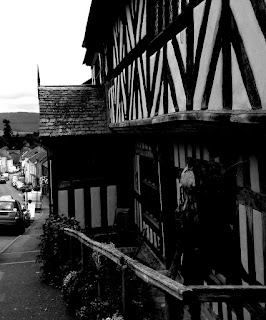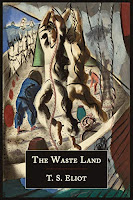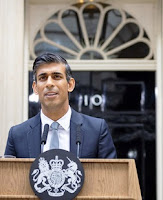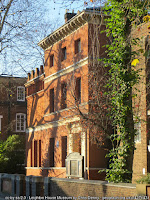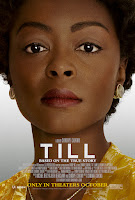Rishi Sunak should take a leaf out of Mr Gladstone's book and give his fortune away, argues Eduardo Reyes.Leaving aside our different locations on the political paint chart of this country, I can see that Rishi Sunak wants to be first known, and then remembered, as a good prime minister.
To get to ‘good’ he faces some fierce headwinds.
But I have an absolute zinger of an idea as to how he can remove a major threat to his aspiration.
Sunak, having first discussed the matter with his wife, should say they are giving up pretty much all of their extraordinary wealth.
It’s getting in his way. Their way.
Their asset protection, tax avoidance strategy – that non-dom status – possibly cost him his first shot at being PM. It was awkward, and that awkwardness overshadowed his pitch.
Right now, his enemies (mostly, though not exclusively, within the post-logic Conservative party), opponents, the media, campaigners and folk with a benign curiosity are sniffing around his arrangements and his family’s affairs.
Why run the risk? He’ll have seen the hit that his fellow parliamentarian Nadim Zahawi took when ex Clifford Chance tax lawyer Dan Niedle started to take an interest in the former’s tax affairs. And that line of inquiry is not even spent.
Wealth is interesting. Why wouldn’t we look?
Am I mad, you might be thinking? Perhaps unrealistic or naïve? Surely the world doesn’t work like that? As the song has it, the rich get rich, and the poor get poorer.
In between time, in the mean time, ain’t we got… actually, a chat about politics and wealth. Because it really is all about political context.
Let’s talk about William Ewart Gladstone, son of Sir John Gladstone. When slavery was abolished the compensation scheme listed dad-Sir-John as the single biggest recipient of payments to make up for his sad loss of enslaved labour.
A Liberal hero of mine, and possibly yours, sits on such slave money.
But perhaps the question was, or is, ‘What will/did he (Sunak/Gladstone) do with it?’
‘What will he do with it?’ was the question posed by Edward Bulwer Lytton, a 19th Century Liberal turned Conservative, in his novel of the same name.
It is not quite off topic to note that in the novel, leading 14 sub-plots (there is no main plot), is the one where ‘he’ is a half blind peasant actor cared for by his angelic granddaughter, ‘it’ is £5, and what he does ‘with it’ is he buys a prize performing poodle, so the two of them can be self sufficient.
In literary and political terms, it showed the poor really can stand on their own two feet with a bit of thought. (Though, spoiler alert, the dog isn’t there at the finish.)
Back in the room, as hypnotists say.
W.E, Gladstone’s awkward wealth was for so long uninterrogated because of the liberal, and Liberal, bent his life took. Early parliamentary activity, the website ‘They Work For You’ would have shown if online in the 19th Century, had Tory-era Gladstone speaking up for enslaver interests. He changed, and his original position is mostly forgotten.
And so back to Sunak. He had a period as a rich but beneficent chancellor of the exchequer. When he was the sponsor of the furlough scheme and Covid business continuity grants, we weren’t talking about the fact he might have a secret share in an ultra-high-net-worth pasta and toilet roll mine that only he and his mates could access.
But things are different for him now. It might, or might not, be the right thing for him to cut certain taxes, or reduce regulation in certain sectors. But the suspicion of both self interest, and a lack of empathy with folk unimaginably worse off, clings to him like so many barnacles as he does it.
So he should give up the wealth.
Other ultra-rich people are talking about this. They range from folk who worry about their children becoming a pastiche of obnoxious trustafarian privilege, to others who look at the climate crisis, autocracy or modern slavery
Embed from Getty Imagesand wonder if their extraordinary wealth should go to change the things that worry them and elicit their sympathy.
Why shouldn’t the Sunaks join them?
There is a tendency in new-right circles to conflate ‘wealth’ with ‘wealth creation’. They are different. Inherited wealth, as some members of early 20th Century Liberal governments saw, is utterly different to wealth creation. The difference, for this prime minister, will be unpicked if he cleaves to the notion that these are the same.
What, we and Sunak, should ask, is the purpose of wealth?
It is a question worth asking – worth asking for the wealthy and for the rest of us.
When it comes to private wealth, up to $68 trillion will transfer to another generation in the next 25 years. That dwarfs the wealth of many nations. It is spectroscopic in scale. The imagination of Scott Fitzgerald would have struggled to express it. It is far bigger than ‘a diamond the size of the Ritz’.
What happens to it matters. If it all takes the route of asset protection, tax avoidance and vanity projects, that will be a problem.
If Sunak’s wealth stops him doing well the PM job he wanted for so long, because details of its maintenance are exposed as, by turns, unideal or taxationally cirumnavational, he’ll kick himself.
Why not, say, keep just two houses and, say £5m in the bank. Everything else is holding him back.
If he doesn’t do this, every decision of his that cuts a tax or a benefit will be judged, scutinised, resisted and may be frustrated because of his own status as being absurdly wealthy. He won’t be able to argue for the much derided ‘Laffer curve’ without his intentions being doubted.
He can’t take it with him – none of us can. But we hope to sense we leave a legacy of something – a skein above us that could be love, could be a reputation for good government, but is certainly something that a figure north of £730m, perhaps surprisingly (perhaps unsurprisingly), cannot buy.
Bulwer Lytton, in his Liberal youth, thought the independent income a right-thinking gentleman got from the land gave him the ability to assess political and artistic questions with an objective head.
But with a right leaning government, led by wealth, the money takes on a different colour.
As for Sunak, on his largely unearned income: what, as Bulwer Lytton asked, will he do with it? What he should do, for his own sake, is give almost all of it away.
Eduardo Reyes is a journalist and low-net-worth individual. He read history at Clare College Cambridge, and is a member of the sneering, metropolitan liberal elite. He lives in South London. You can follow him on Twitter.

